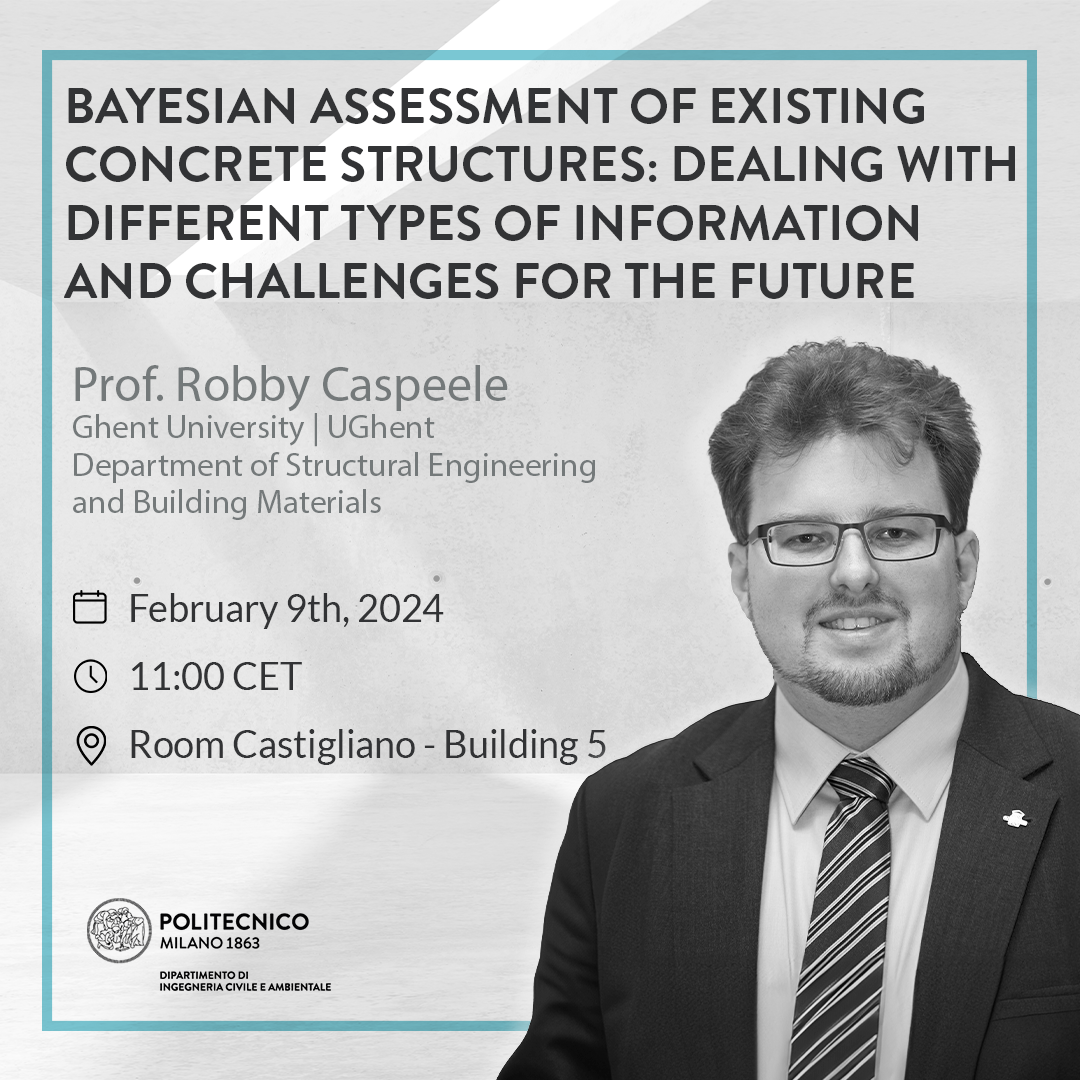
- This event has passed.
Bayesian assessment of existing concrete structures: dealing with different types of information and challenges for the future
9 February 2024 @ 11:00 - 13:00

On February 9th, at 11:00 AM, a seminar titled “Bayesian assessment of existing concrete structures: dealing with different types of information and challenges for the future” will take place in Room Castigliano (Building 5 – Piazza Leonardo da Vinci, 32 – Milan).
The seminar will be conducted by Prof. Robby Caspeele (Magnel-Vandepitte Laboratory, Department of Structural Engineering and Building Materials, Ghent University, Belgium).
Abstract
An increasing amount of the current activities in the construction sector are oriented towards the assessment of existing structures and the associated repair and upgrading interventions. Although the last decennia significant progress has been made to analytically and numerically simulate the degradation process of concrete structures and their associated structural performance prediction in time, structural engineers are challenged to deal with the large uncertainties involved. Besides a typical lack of information, the degradation processes are associated with large uncertainties and when executing additional investigations and measurements, significant model and measurement uncertainties play a dominant role in the reliability-based performance prediction. Bayesian updating techniques provide a unique engineering tool, enabling to make inferences where classical statistical approaches fail. It is explained and illustrated how Bayesian updating techniques provide an undeniable advantage in several steps of the assessment process. Degradation models whose parameters generally are difficult to find consensus about, can gradually be updated when more information becomes available. Variables in structural reliability calculations can be updated on the basis of direct as well as indirect measurement data. Sources of information contained in different types of measurements or even visual inspections can be combined in order to make much more informed inferences and to reduce uncertainties in the reliability-based performance assessment, compared to when such data is analysed separately. The integration of these approaches into the practical assessment process is proven to be feasible and an outlook is given on future engineering challenges to integrate such approaches further in the life-cycle assessment of existing concrete structures.
Speaker’s bio
Robby Caspeele is a professor in the field of Structural Reliability at Ghent University (UGent) since 2013 and one of the technical directors of the Magnel-Vandepitte Laboratory for Structural Engineering and Building Materials. He received his MSc degree in Civil Engineering in 2006 and his PhD in Civil Engineering in 2010. His main areas of expertise relate to (1) full- and semi-probabilistic structural reliability methods and Bayesian updating techniques in relation to performance-based life-cycle analysis of concrete structures, (2) structural robustness and membrane action in concrete structures in relation to design against progressive collapse as a result of foreseen and unforeseen events and (3) structural assessment of existing structures in relation to time-dependent degradation, combining numerical structural analysis approaches with Bayesian updating techniques, decision making for structural interventions and lifetime performance optimization. He is author of more than 75 publications in peer-reviewed journals and over 200 papers in international scientific conference proceedings. He is also strongly involved in international committees and working groups related to the development of technical guidelines and standards. Among others, he is a board member of the Joint Committee on Structural Safety, co-convenor of fib Commission 3 on Existing Structures and chair of the Belgian mirror committee for the Eurocodes.
